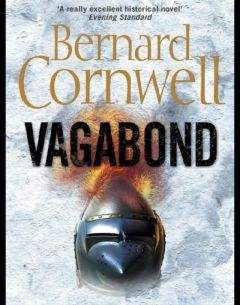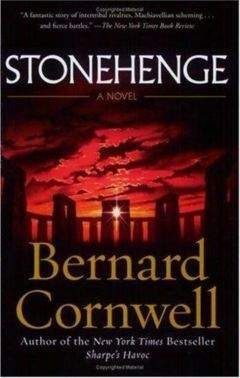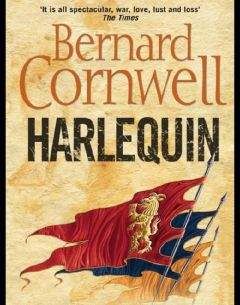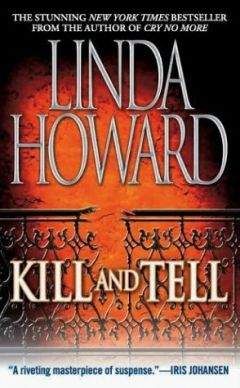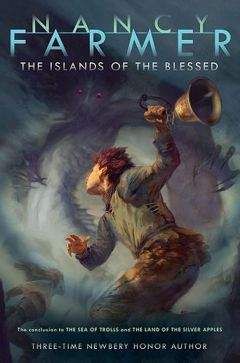'What's happening?' Brother Collimore asked.
'We are doing God's work,' de Taillebourg said soothingly, 'God's work.'
And on the ridge the arrows flew.
Thomas advanced with the archers of the left-hand battle and they had not gone more than twenty yards when, just beyond a ditch, a bank and some newly planted blackthorn saplings, they were forced to their right because a great scoop had been taken out of the ridge's flank to leave a hollow of ground with sides too steep for the plough. The hollow was filled with bracken that had turned yellow and at its far side was a lichen-covered stone wall and Thomas's arrow bag caught and tore on a rough piece of the coping as he clambered across. Only one arrow fell out, but it dropped into a mushroom fairy ring and he tried to work out whether that was a good or a had omen, but the noise of the Scottish drums distracted him. He picked up the arrow and hurried on. All the enemy drummers were working now, rattling their skins in a frenzy so that the air itself seemed to vibrate. The Scottish men-at-arms were heft-ing their shields, making sure they protected the pike-men, and a crossbowman was working the ratchet that dragged back his cord and lodged it on the trigger's hook. The man glanced up anxiously at the advancing English bowmen, then discarded the ratchet handles and laid a metal quarrel in the crossbow's firing trough. The enemy had begun to shout and Thomas could distinguish some words now. 'If you hate the English,' he heard, then a crossbow bolt hummed past him and he forgot about the enemy chant. Hundreds of English archers were advancing through the fields, most of them running. The Scots only had a few crossbows. but those weapons outranged the longer war bows of the English who were hurrying to close that range. An arrow slithered across the grass in front of Thomas. Not a crossbow bolt, but an arrow from one of the few Scottish yew bows and the sight of the arrow told him he was almost in range. The first of the English archers had stopped and drawn back their cords and then their arrows flickered into the sky. A bowman in a padded leather jerkin fell backwards with a crossbow bolt embedded in his forehead. Blood spurted skywards where his last arrow, shot almost vertically, soared uselessly.
'Aim at the archers!' a man in a rusted breastplate bellowed. 'Kill their archers first!'
Thomas stopped and looked for the royal standard. It was off to his right, a long way off, but he had shot at further targets in his time and so he turned and braced himself and then, in the name of God and St George, he put his chosen arrow onto the string and drew the white goose feathers back to his ear. He was staring at King David II of Scotland, saw the sun glint gold off the royal helmet, saw too that the King's visor was open and he aimed for the chest, nudged the bow right to compensate for the wind, and loosed. The arrow went true, not vibrating as a badly made arrow would, and Thomas watched it climb and saw it fall and saw the King jerk backwards and then the courtiers closed about him and Thomas laid his second arrow across his left hand and sought another target. A Scottish archer was limping from the line, an arrow in his leg. The men-at-arms closed about the wounded man, sealing their line with heavy shields. Thomas could hear hounds baying deep among the enemy formation, or perhaps he was hearing the war howl of the tribesmen. The King had turned away and men were leaning towards him. The sky was filled with the whisper of flying arrows and the noise of the bows was a steady, deep music. The French called it the devil's harp music. There were no Scottish archers left that Thomas could see. They had all been made targets by the English bowmen and the arrows had ripped the enemy archers into bloody misery, so now the English turned their missiles on the men with pikes, swords, axes and spears. The tribesmen, all hair and beard and fury, were beyond the men-at-arms who were arrayed six or eight men deep, so the arrows rattled and clanged on armour and shields. The Scottish knights and men-at-arms and pike-carriers were sheltering as best they could, crouching under the bitter steel rain. but some arrows always found the gaps between the shields while others drove clean through the leather-covered willow boards. The thudding sound of the arrows hitting shields was rivalling the sharper noise of the drums.
'Forward, boys! Forward!' One of the archers' leaders encouraged his men to go twenty paces nearer the enemy so that their arrows could bite harder into the Scottish ranks. 'Kill them, lads!' Two of his men were lying on the grass, proof that the Scottish archers had lone some damage before they were overwhelmed with English arrows. Another Englishman was staggering as :hough he were drunk, weaving back towards his own &le and clutching his belly from which blood trickled town his leggings. A bow's cord broke, squirting the arrow sideways as the archer swore and reached under his tunic to find a spare.
The Scots could do nothing now. They had no archers eft and the English edged closer and closer until they were driving their arrows in a flat trajectory that whipped the steel heads through shields, mail and even the rare suit of plate armour. Thomas was scarce seventy yards from the enemy line and choosing his targets with :old deliberation. He could see a man's leg showing under a shield and he put an arrow through the thigh. The drummers had fled and two of their instruments, their skins split like rotten fruit, lay discarded on the turf. A nobleman's horse was close behind the dis-mounted ranks and Thomas put a missile deep into the destrier's chest and, when he next looked, the animal was down and there was a flurry of panicking men trying to escape its thrashing hooves and all of those men, exposing themselves by letting their shields waver, went down under the sting of the arrows and then a moment later a pack of a dozen hunting dogs, longhaired, yellow-fanged and howling, burst out of the cowering ranks and were tumbled down by the slicing arrows.
'Is it always this easy?' a boy, evidently at his first battle, asked a nearby archer.
'If the other side don't have archers,' the older man answered, 'and so long as our arrows last, then it's easy. After that it's shit hard.'
Thomas drew and released, shooting at an angle across the Scottish front to whip a long shaft behind a shield and into a bearded man's face. The Scottish King was still on his horse, but protected now by four shields that were all bristling with arrows and Thomas re-membered the French horses labouring up the Picardy slope with the feathertipped shafts sticking from their necks, legs and bodies. He rummaged in his torn arrow bag, found another missile and shot it at the King's horse. The enemy was under the flail now and they would either run from the arrow storm or else, enraged, charge the smaller English army and, judging by the shouts coming from the men behind the arrow-stuck shields, Thomas suspected they would attack.
He ryas right. He had time to shoot one last arrow and then there was a sudden terrifying roar and the whole Scottish line, seemingly without anyone giving an order, charged. They ran howling and screaming, stung into the attack by the arrows, and the English archers fled. Thousands of enraged Scotsmen were charging and the archers, even if they shot every arrow they possessed into the advancing horde, would be overwhelmed in a heartbeat and so they ran to find shelter behind their own men-at-arms. Thomas tripped as he climbed the stone wall, but he picked himself up and ran on, then saw that other archers had stopped and were shooting at their pursuers. The stone wall was holding up the Scots and he turned round himself and put two arrows into defenceless men before the enemy surged across the barrier and forced him back again. He was running towards the small gap in the English line where St Cuthbert's Mass cloth waved, but the space was choked with archers trying to get behind the armoured line and so Thomas went to his right, aiming for the sliver of open ground that lay between the army's flank and the ridge's steep side.
'Shields forward!' a grizzled warrior, his helmet visor pushed up, shouted at the English men-at-arms. 'Brace hard! Brace hard!' The English line, only four or five ranks deep, steadied to meet the wild attack with their shields thrust forward and right legs braced back. 'St George! St George!' a man called. 'Hold hard now! Thrust hard and hold hard!'
Thomas was on the flank of the army now and he turned to see that the Scots, in their precipitate charge, had widened their line. They had been arrayed shoulder to shoulder in their first position, but now, running, they had spread out and that meant their westernmost sheltron had been pushed down the ridge's slope and into the deep hollow that so unexpectedly narrowed the battle ground. They were down in the hollow's bottom, staring up at the skyline, doomed.
'Archers!' Thomas shouted, thinking himself back in France and responsible for a troop of Will Skeat's bow-men. 'Archers!' he bellowed, advancing to the hollow's lip.
'Now kill them!' Men came to his side, yelped in triumph and drew back their cords. Now was the killing time, the archers' time. The Scottish right wing was down in the sunken ground and the archers were above them and could not miss. Two monks were bringing spare sheaves of arrows, each sheaf holding twenty-four shafts evenly spaced about two leather discs that kept the arrows apart and so protected their feathers from being crushed. The monks cut the twine holding the arrows and spilt the missiles on the ground beside the archers who drew again and again and killed again and again as they shot down into the pit of death. Thomas heard the deafening crash as the men-at-arms collided in the field's centre, but here, on the English left, the Scots would never come to their enemy's shields because they had spilled into the low yellow bracken of death's kingdom.
Thomas's childhood had been spent in Hookton, a village on England's south coast where a stream, coming to the sea, had carved a deep channel in the shingle beach. The channel curved to leave a hook of land that protected the fishing boats and once a year, when the rats became too thick in the holds and bilges of the boats, the fishermen would strand their craft at the bottom of the stream, fill their bilges with stones and let the incoming tide flood the stinking hulls. It was a holiday for the village children who, standing on the top of the Hook, waited for the rats to flee the boats and then, with cheers and screams of delight, they would stone the animals. The rats would panic and that would only Lncrease the children's glee as the adults stood around and laughed, applauded and encouraged.
It was like that now. The Scots were in the low ground, the archers were on the lip of the hill and death was their dominion. The arrows were flashing straight down the slope, scarce am' arc in their flight, and strik-ing home with the sound of cleavers hitting flesh. The Scots writhed and died in the hollow and the yellow autumn bracken turned red. Some of the enemy tried to climb towards their tormentors, but they became the easiest targets. Some attempted to escape up the far side and were struck in the back, while some fled down the hill in ragged disarray. Sir Thomas Rokeby, Sheriff of Yorkshire and commander of the English left, saw their escape and ordered two score of his men to mount their horses and scour the valley. The mailed riders swung their swords and morningstars to finish the archers' bloody work.
The base of the hollow was a writhing, bloody mass. A man in plate armour, a plumed helmet on his head, tried to climb out of the carnage and two arrows whipped through his breastplate and a third found a slit in his visor and he fell back, twitching. A thicket of arrows jutted from the falcon on his shield. The arrows became fewer now, for there were not many Scotsmen left to kill and then the first archers scrambled down the slope with drawn knives to pillage the dead and kill the wounded.
'Who hates the English now?' one of the archers jeered. 'Come on, you bastards, let's hear you? Who hates the English now?'
Then a shout sounded from the centre. 'Archers! To the right! To the right!' The voice had a note of sheer panic. 'To the right! For God's sake, now!'
The men-at-arms of the English left were scarcely engaged in the fight because the archers were slaughtering the Scots in the low bracken. The English centre was holding firm for the Archbishop's men were arrayed behind a stone wall which, though only waist high, was a more than adequate barrier against the Scottish assault. The invaders could stab, lunge and hack over the wall's coping, and they could try to climb it and they could even try to pull it down stone by stone, but they could not push it over and so they were checked by it and the English, though far fewer, were able to hold even though the Scots were lunging at them with their heavy pikes. Some English knights called for their horses and, once mounted and armed with lances, pressed up close behind their beleaguered comrades and rammed the lances at Scottish eyes. Other men-at-arms ducked under the unwieldy pikes and hacked with swords and axes at the enemy and all the while the long arrows drove in from the left. The noise in the centre was the shouting of men in the rearward ranks, the screaming of the wounded, the clangour of blade on blade, the crack of blade on shield and the clatter of lance on pike, but the wall meant that neither side could press the other back and so, crammed against the stones and encumbered by the dead, they just lunged, hacked, suffered, bled and died. But on the English right, where Lord Neville and Lord Percy commanded, the wall was unfinished, nothing more than a pile of stones that offered no obstacle to the assault of the Scottish left wing that was commanded by the Earl of March and by the King's nephew, Lord Robert Stewart. Their sheltron, closest to the city, was the largest of the three Scottish divisions and it came at the English like a pack of wolves who had not fed in a month. The attackers wanted blood and the archers fled from their howling charge like sheep scattering before fangs and then the Scots struck the English right and the sheer momentum of their assault drove the defenders back twenty paces before, somehow, the men-at-arms managed to hold the Scots who were now stumbling over the bodies of the men they had wounded or killed. The English, cramming themselves shoulder to shoulder, crouched behind their shields and shoved back, stabbing swords at ankles and faces, and grunting with the effort of holding the vast pressure of the Scottish horde. It was hard to fight in the front ranks. Men shoved from behind so that Englishmen and Scotsmen were close as lovers, too close to wield a sword in anything except a rudimentary stab. The ranks behind had more room and a Scotsman chopped down with a pike that he wielded like a giant axe, its blade crunching down into an enemy's head to split helmet, leather liner, scalp and skull as easily as an unboiled egg. Blood fountained across a dozen men as the dead soldier fell and other Scots pushed into the gap his death had caused, and a clansman tripped on the body and screamed as an Englishman sawed at his exposed neck with a blunt knife. The pike dropped again, killing a second man. and this time, when it was lifted up, the dead man's crumpled visor was caught on the pike's bloody spike.
The drums, those that were still whole, had begun their noise again, and the Scots heaved to their rhythm. 'The Bruce! The Bruce!' some chanted while others called on their patron, 'St Andrew! St Andrew!' Lord Robert Stewart, gaudy in his blue and yellow colours and with a thin fillet of gold about the brow of his helmet, used a two-handed sword to chop at the English men-at-arms who cowered from the rampant Scots. Lord Robert, safe from arrows at last, had lifted his visor so he could see the enemy. 'Come on!' he screamed at his men. 'Come on! Hard into them! Kill them! Kill them!' The King had promised that the Christmas feast would be in London and there seemed only a small screen of frightened men to break before that promise could come true. The riches of Durham, York and London were just a few sword strokes away; all the wealth of Norwich and Oxford, of Bristol and Southampton was only a handful of deaths from Scottish purses. 'Scotland! Scotland! Scotland!' Lord Robert called. 'Scotland!' And the pikeman, because the trapped visor was obstructing his blade, was beating on a man's helmet with the hook side of his weapon's head, not chopping through the metal, but smashing it, hammering the broken helmet into the dying man's brain so that blood and jelly oozed from the visor's slits. An Englishman screamed as a Scottish pike struck through his mail into his groin. A boy, perhaps a page, reeled back with his eves bloodied from a sword slash. 'Scot-land!' Lord Robert could smell the victory now. So close! He shoved on, felt the English line jar and move hack, saw how thin it was, fended off a lunge with his shield, stabbed with his sword to kill a fallen and wounded enemy, shouted at his squires to keep a watch for any rich English nobleman whose ransom could enrich the house of Stewart. Men grunted as they stabbed and hacked. A tribesman reeled from the fight, gasping for breath, trying to hold his guts inside his slashed belly. A drummer was beating the Scots on. 'Bring my horse!' Lord Robert called to a squire. He knew that the beaten English line had to break in a moment and then he would mount, take his lance, and pursue the beaten enemy. 'On! On!' he shouted. 'On!' And the man wielding the longhafted pike, the huge Scotsman who had driven a gap into the English front rank and who seemed to be carving a bloody path south all by himself, suddenly made a mewing noise. His pike, high in the air where it was still fouled with the bent visor, faltered. The man jerked and his mouth opened and closed, opened and closed again, but he could not speak because an arrow, its white feathers bloodied, jutted from his head. An arrow, Lord Robert saw, and suddenly the air was thick with them and he pulled down the visor of his helmet so that the day went dark.
